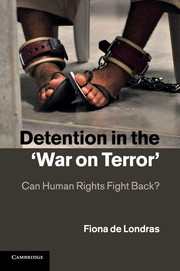Book contents
- Frontmatter
- Contents
- Acknowledgements
- Introduction
- 1 Panic, fear and counter-terrorist law-making
- 2 The right to be free from arbitrary detention
- 3 Counter-terrorist detention: the executive approach
- 4 Legislating for counter-terrorist detention
- 5 International human rights law's resilience in the face of panic
- 6 Judicial responses to counter-terrorist detention: rights-based resistance?
- Conclusion
- Bibliography
- Index
2 - The right to be free from arbitrary detention
Published online by Cambridge University Press: 05 August 2011
- Frontmatter
- Contents
- Acknowledgements
- Introduction
- 1 Panic, fear and counter-terrorist law-making
- 2 The right to be free from arbitrary detention
- 3 Counter-terrorist detention: the executive approach
- 4 Legislating for counter-terrorist detention
- 5 International human rights law's resilience in the face of panic
- 6 Judicial responses to counter-terrorist detention: rights-based resistance?
- Conclusion
- Bibliography
- Index
Summary
In introducing a wide-ranging and repressive system of counter-terrorist detention, the US and the UK argued variously that they needed to do so and that it was permitted as a matter of law or, if not so permitted, that the prevailing legal standards failed to take into account the nature and scope of the threat posed to national and international security by Al Qaeda. In fact, the international (and domestic) legal systems did not generally permit a counter-terrorist detention system as wide-ranging and repressive as the one proposed and enacted. That is not to suggest that international human rights law did not allow any repressive action at all on the part of states engaged in countering terrorism. Critics of international human rights law from a security-perspective tend to assert an incompatibility between rights and security, but such dichotomous thinking ignores the fact that international human rights law was designed with exceptions to its general application for exigencies such as emergencies expressly in mind. So too is it designed in a manner that recognises the usefulness and necessity of occasional detention. Rather than protecting a right to liberty in its broad and general sense, international human rights law protects a right to be free from arbitrariness in the deprivation of one's liberty. No legal system could insist on an absolute right to liberty; after all we accept that one may be subject to detention of varying kinds on the basis of, for example, criminal conviction, public order, public health and so on. What we expect instead of absolute liberty is liberty that is infringed upon only in accordance with rights-protecting limits. In particular, we expect that when we are deprived of our liberty it will only be in a limited number of circumstances (i.e. that there are defined bases for detention) and in a challengeable manner (i.e. that the basis for detention can be adjudicated upon by a competent authority whose decisions will be respected by the detaining authority). As outlined in this chapter, those two features of the right to be free from arbitrary detention existed within the US, the UK and international human rights law at the time of the attacks on 11 September 2001. In addition, all three bodies of law recognise that at times states need to be able to act in a more muscular (or repressive) manner than is normally the case; in other words, we recognise the necessity of what Ní Aoláin and Gross have described as accommodation for crisis or emergency. The models of accommodation offered by all three systems allow for some leeway or flexibility in terms of both factors (limited bases for detention and review of detention). Crucially, however, they do not permit of absolutely unlimited power; at their core, all three models share a constitutionalist vision of limited and accountable power that the ‘War on Terror’ counter-terrorist detention strategy of the US and the UK sought to reject, or at least disable.
- Type
- Chapter
- Information
- Detention in the 'War on Terror'Can Human Rights Fight Back?, pp. 36 - 71Publisher: Cambridge University PressPrint publication year: 2011



